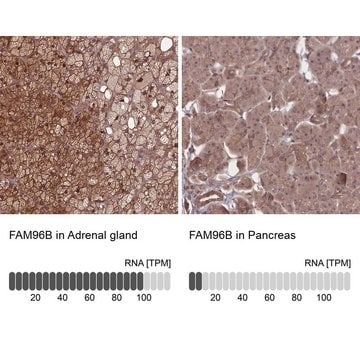W242810
Ethyl isobutyrate
natural, ≥98%, FCC, FG
Synonyme(s) :
2-methyl propionic acid ethyl ester, Ethyl 2-methylpropanoate, Ethyl isobutanoate
About This Item
Produits recommandés
Qualité
FG
Fragrance grade
Halal
Kosher
natural
Niveau de qualité
Agence
follows IFRA guidelines
meets purity specifications of JECFA
Conformité réglementaire
EU Regulation 1223/2009
EU Regulation 1334/2008 & 178/2002
FCC
FDA 21 CFR 117
Densité de vapeur
4.01 (vs air)
Pression de vapeur
40 mmHg ( 33.8 °C)
Pureté
≥98%
Caractéristiques du produit alternatif plus écologique
Less Hazardous Chemical Syntheses
Use of Renewable Feedstocks
Learn more about the Principles of Green Chemistry.
sustainability
Greener Alternative Product
Indice de réfraction
n20/D 1.387 (lit.)
Point d'ébullition
112-113 °C (lit.)
Densité
0.865 g/mL at 25 °C (lit.)
Application(s)
flavors and fragrances
Documentation
see Safety & Documentation for available documents
Allergène alimentaire
no known allergens
Allergène de parfum
no known allergens
Autre catégorie plus écologique
Propriétés organoleptiques
fruity; ethereal; sweet
Chaîne SMILES
CCOC(=O)C(C)C
InChI
1S/C6H12O2/c1-4-8-6(7)5(2)3/h5H,4H2,1-3H3
Clé InChI
WDAXFOBOLVPGLV-UHFFFAOYSA-N
Vous recherchez des produits similaires ? Visite Guide de comparaison des produits
Catégories apparentées
Mention d'avertissement
Danger
Mentions de danger
Conseils de prudence
Classification des risques
Flam. Liq. 2
Code de la classe de stockage
3 - Flammable liquids
Classe de danger pour l'eau (WGK)
WGK 2
Point d'éclair (°F)
68.0 °F - closed cup
Point d'éclair (°C)
20 °C - closed cup
Équipement de protection individuelle
Eyeshields, Faceshields, Gloves, type ABEK (EN14387) respirator filter
Certificats d'analyse (COA)
Recherchez un Certificats d'analyse (COA) en saisissant le numéro de lot du produit. Les numéros de lot figurent sur l'étiquette du produit après les mots "Lot" ou "Batch".
Déjà en possession de ce produit ?
Retrouvez la documentation relative aux produits que vous avez récemment achetés dans la Bibliothèque de documents.
Notre équipe de scientifiques dispose d'une expérience dans tous les secteurs de la recherche, notamment en sciences de la vie, science des matériaux, synthèse chimique, chromatographie, analyse et dans de nombreux autres domaines..
Contacter notre Service technique








